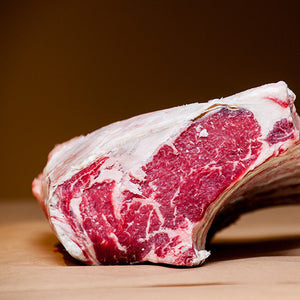In an increasingly polarized food community in which vegetarians’ advocate for a diet free from animals, I have found myself baffled by the rhetoric and misinformation propagated by this close-minded collective. Since the inception of EPIC in 2013, anti-meat propaganda has only accelerated and unfortunately continues to misguide and deceive consumers. As a result, vegetarian misinformation has influenced popular and deep-held beliefs in our culture by suggesting that meat consumption is destroying our planet, making us sick, and is inhumane towards animals. We hear different iterations of this myth every day and the vegetarian community has succeeded in making omnivores feel guilty and apologetic for eating meat. Unfortunately, this propaganda has resulted in behaviors that in many cases only proliferate our problems of environmental degradation, malnourishment, and economic despair.
Out of all attacks against meat, the misinformation that animal fat and protein is bad for our health is easily the most inaccurate and disproven. It’s a belief that has no substance and easy to defend. In this blog we want to shed truth on the health benefits of meat and debunk popular vegetarian propaganda that animal protein is bad for our health.  It’s clear to see that we have an emerging health crisis connected with the American diet. Our friends, families, and fellow citizens are getting fatter, have high blood pressure, and are increasingly suffering and dying from chronic disease (heart disease, diabetes, and stroke). From 1960 through today, the average weight of an American man rose from 166 to 191 pounds! The average woman went from 140 to 164 pounds, and most disturbing nearly 1/3 of children are now overweight! An underlying narrative in our public consciousness attributes many of these health issues to eating too much meat and eating too much fat. But can that really be true?
It’s clear to see that we have an emerging health crisis connected with the American diet. Our friends, families, and fellow citizens are getting fatter, have high blood pressure, and are increasingly suffering and dying from chronic disease (heart disease, diabetes, and stroke). From 1960 through today, the average weight of an American man rose from 166 to 191 pounds! The average woman went from 140 to 164 pounds, and most disturbing nearly 1/3 of children are now overweight! An underlying narrative in our public consciousness attributes many of these health issues to eating too much meat and eating too much fat. But can that really be true?
Public opinion has been shaped by poor research that can be traced back to a 1953 study conducted by Ancel Keys. In his “research” Keys attributed saturated fat as the primary cause of heart disease and as a result changed our diets for generations to follow. As a result, Americans cut back on red meat and animal fats while replacing them with vegetable oils and an increasing amount of grains, processed sugars, and carbohydrates. Since this detrimental shift in our diets the American public has suffered considerably worse with respect to the health of our nation. After we replaced animal protein and fat with carbohydrates (bread, pasta, rice), sugars (processed food, fruits, colas), and unsaturated fats (vegetable oil, margarine) obesity and hypertension soared while heart disease and stroke rates persisted.

Despite the degenerating trends in public health (which popular opinion continues to advocate for avoiding animal meat and fat), vegetarians continue to claim that "Americans eat too much meat". This statement is inaccurate and a further catalyst for our declining health as a nation. In 1905 Americans ate 71 pounds of beef per person whereas in 2010 the number decreased to 60 pounds. With clear statistics on the decreased consumption of animal meat yet a dramatic rise in Americas overall weight gain and diseases rates, one cannot simply say that “eating too much meat” is the problem. It is clear that we are actually eating less meat today than we were a century ago.
The vilification of saturated fat, animal protein, and cholesterol has been misguided. As we learn more about diet and health, it has become increasingly clear that the greatest threat to our nation’s health is CARBOHYDRATES and SUGAR, not animal meat. In the last century consumption of added sweetness rose steadily to over 60%. Today the average American eats 130 pounds of sugar each year (more sugar than meat)! Once removing meat, carbohydrates and sugars become a staple for the vegetarian diet and accelerate a cascading effect of degeneration.
From an evolutionary perspective it is easy to observe that humans have evolved consuming pastured meats for the last 250,000 years. This form of nutrition is deeply encoded into our genetics and we have mastered processing meat and fat while effeciently converting it to energy directed towards nourishing our bodies. Research illuminates that modern Hunter-gatherer tribes who consume diets high in animal meat and low in grains and sugar are virtually free of chronic diseases. Throughout the history of our species, humans have lived 99.999% of our evolution WITHOUT sugar, (limited exceptions of seasonal fruits and wild honey) as a result, we struggle with processing this pernicious ingredient. Metabolizing carbohydrates (sugars and grains) causes our body to release insulin, which leads to weight gain, inflammation, and a slew of modern diseases.


Despite the misled belief that many degenerative diseases are still attributed to red meat consumption (heart disease, obesity, diabetes, and brain degeneration) there is growing evidence of the exact opposite! In fact, high quality grass fed and free range meat can actually help avoid those problems! Red meat is one of the most nutrient dense foods on the planet. It is loaded with all the essential amino acids needed to grow muscle and bone, it is a great source of B vitamins, iron, and zinc. Even better, red meat contains zero carbohydrates/sugars and ranks zero on the glycemic index (a great food for dieters and diabetics looking to lose fat and control insulin).
One of the most amazing aspects of eating meat is the unique bio-availability of the vitamins and minerals. Iron is a great example (Iron deficiency is the most common nutritional disorder in the world and thought to effect up to 80 percent of the population, 30% impacted by full-blown anemia), whereas the natural form occurring in red meat (heme iron) is better absorbed than plant based iron (nonheme). As a result, vegetarians and vegans need to consume twice as much dietary iron each day as meat eaters due to the poor absorption of this plant based mineral. Similarly, the absorption of zinc, vitamin D, and B vitamins are more readily absorbed through consuming red meat when compared to plants.

By now you should be enlightened to realizing that high quality meat is actually good for your health. As with all my blogs devoted to “Defending Meat”, I am specifically referencing meat that is pasture raised and grass fed. Much like carbohydrates affect the human body, grain fed animals become sick and negatively impact the end consumer. I liken grain fed cows to vegans, both consuming diets their bodies are not intended to, both degenerating their health.
Lastly, don’t take my word for it. Talk to the hundreds of thousands of former vegetarians who reintroduced meat into their diets due to degenerative and chronic health issues. Both Katie and myself can put ourselves into that category. After reintroducing grass fed meats our health, athletic performance, and mental focus have peaked. Onwards to the consumption of high quality animal meat! May it heal your body and elevate your existence.



